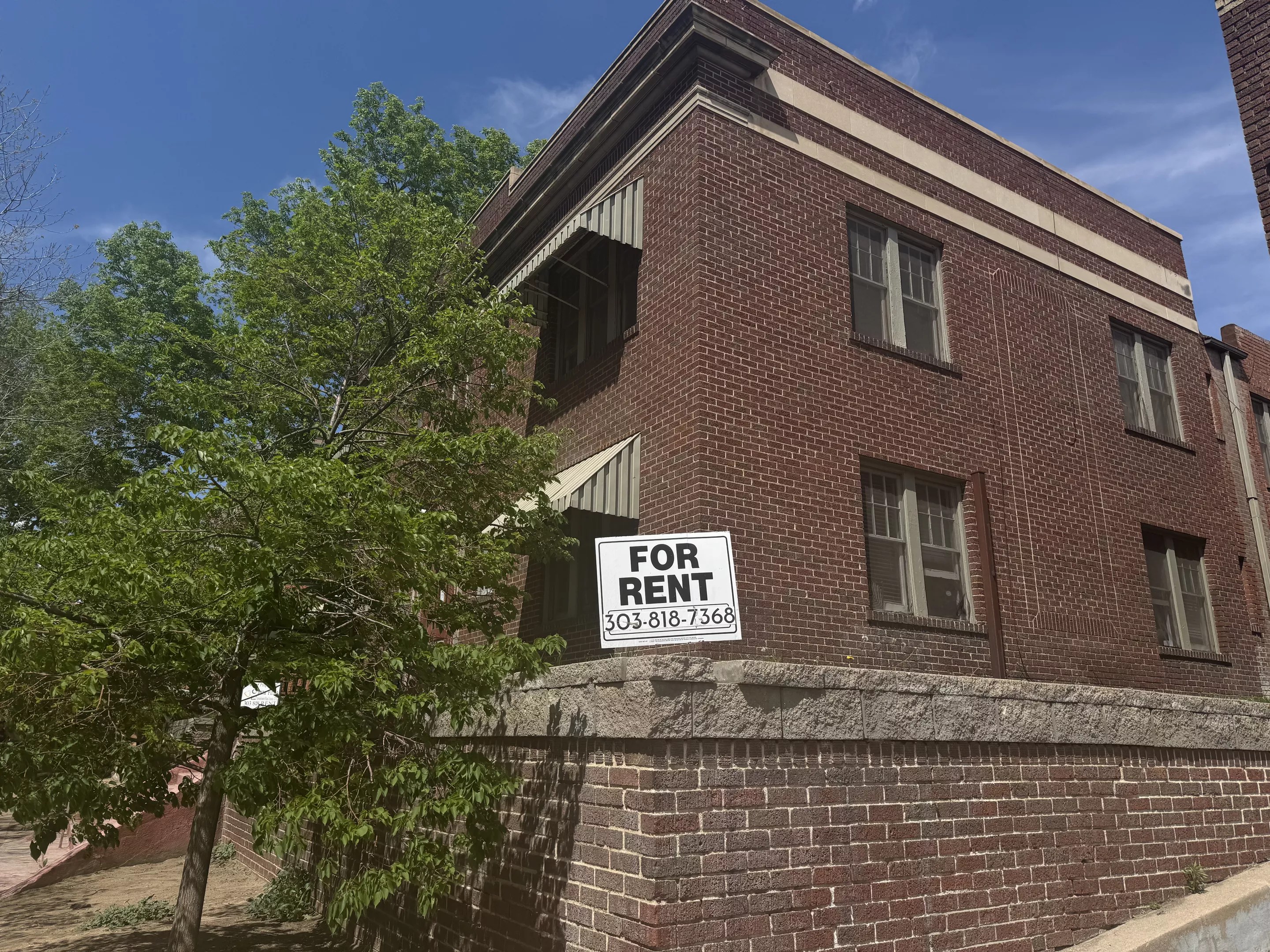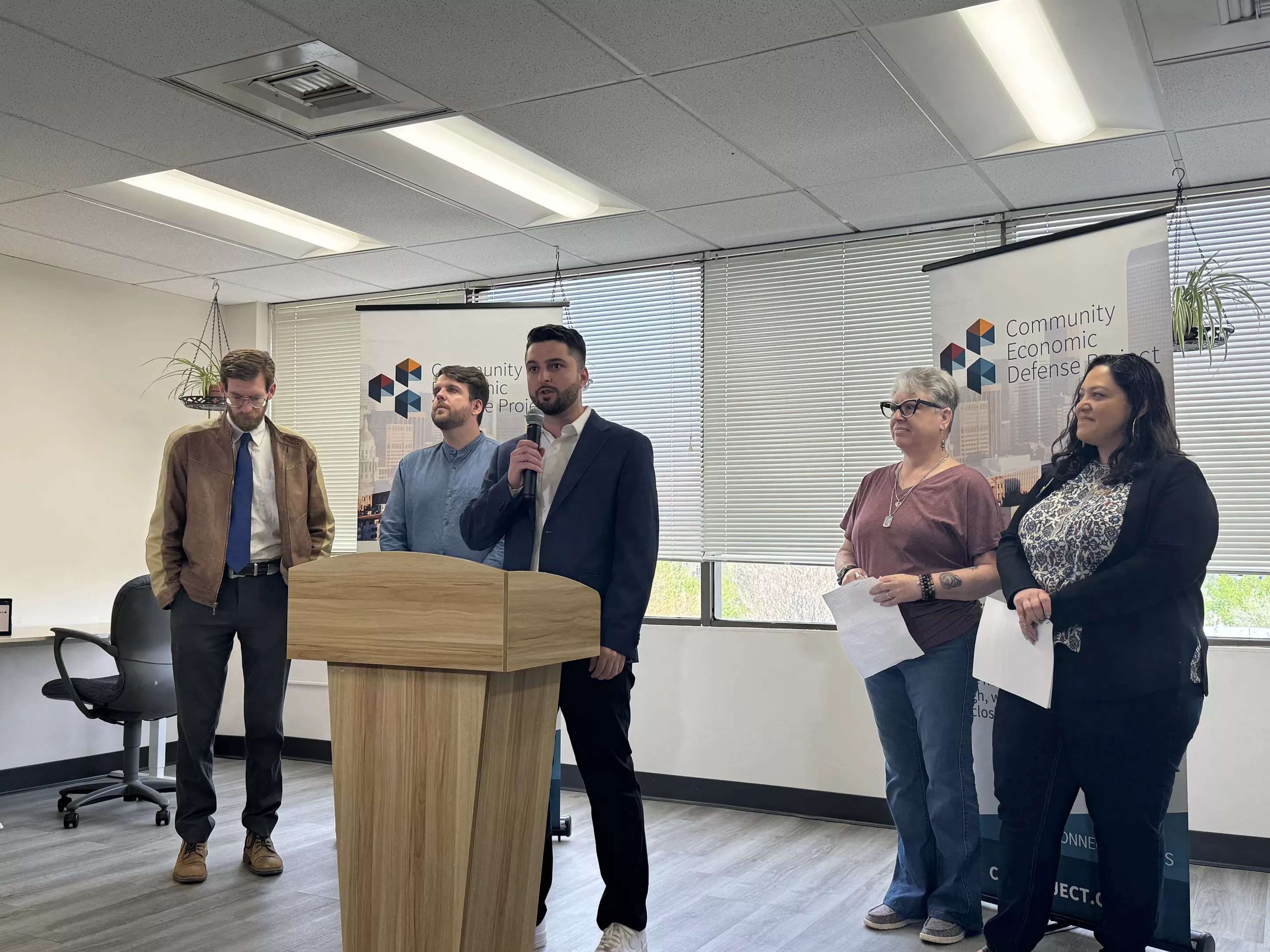
Catie Cheshire

Audio By Carbonatix
Mary Ellen Montaño is a retired social worker who lives in Commerce City, just north of Denver. She expects an increase in rent every year, but Montaño was shocked when it spiked by 12 percent in 2024.
“My rent consumes three-quarters of my income, which leaves me very frustrated at the end of the month,” Montaño said at a May 9 press conference. “When I asked management why my rent was increasing so dramatically, I was told it was due to property repairs, new carpet in common areas, even COVID-related costs. These explanations do not justify such a steep increase.”
After hearing news reports about software landlords use to set rent prices, Montaño looked into her rent payment portal and discovered her landlord uses Real Page. Real Page is the nation’s most notorious rent pricing software; the FBI and the U.S. Department of Justice investigated the company last year for breaching antitrust law in the course of collecting data on rents and telling landlords nationwide what they should charge. In Denver, the Biden Administration estimated Real Page cost the average renter around $136 per month.
This year, Colorado legislators decided to ban algorithmic price-setting software like Real Page, passing House Bill 25-1004. Every Democrat in the Colorado legislature voted in favor of the bill – the only question now is if Democratic Governor Jared Polis will sign it.
On May 9, three of the bill’s prime sponsors – State Representative Javier Mabrey and senators Julie Gonzales and Nick Hinrichsen – gathered at the office of the Community Economic Defense Project (CEDP) to encourage the governor to sign the bill.
“I’m cautiously optimistic that [Polis] will sign the bill, because he has said time and time again he’s all about saving people money,” Mabrey said. “Part of the reason why we’re cautious is, when asked about this, the governor keeps saying he likes math. I don’t exactly know what that means. I like math, too, but if you’re using math in a manipulative way to harm Colorado consumers, that shouldn’t be something that we support.”
The bill sponsors argue that Polis’s work to save Coloradans money, a prime part of his platform, should extend to renters, pointing out that the legislature convened an entire special session in 2024 to give homeowners property tax relief.
Gonzales cited the $136 per month in estimated overcharges from the Real Page scandal – and Denver’s April eviction numbers exceeding 1,400 evictions filed – as evidence that if Polis wants to base his choice on math, the answer is obvious.
“That’s bad math when families are sitting around their kitchen tables trying to make the decisions of, ‘Am I going to pay rent, or am I going to have to skip out on the extra trip to the grocery store, or am I going to cut my prescription pill in half in order to try to stretch it and make ends meet?'” Gonzales said. “The data is clear. Even given all of the work that we have accomplished together to advance housing policy reform over the past several years, renters in this state are still hanging on by their fingernails.”

Advocates and legislators joined to ask Governor Jared Polis to sign a tenants rights bill on May 9.
Catie Cheshire
Polis has already vetoed several bills this session, including a bill changing Colorado’s open records rules and a bill related to social media guardrails for youth. The day before the CEDP presser, Polis said he would veto a bill related to strengthening labor unions.
Polis has not made a clear statement on the bill, with his office only saying he is reviewing the bill.
“Shout-out to every member of the House of Representatives and in the Senate in my party in the legislature, because they chose to side with renters, not with corporate landlords, not with companies who have used math in a creative way to exploit working people,” Mabrey said. “Now it’s time for the governor to do the same.”
CEDP co-founder Sam Gilman said the organization hears stories every day from people at risk of eviction who need help. The organization believes HB 1004 is one way to make sure renters aren’t being taken advantage of.
“The legislation we passed is designed to prevent this economic abuse and keep hard-earned wages in the pocket of Colorado renters,” Gilman said. “It’s really simple. It bans landlords from using, and software companies from selling, algorithms that are designed to help landlords collude and raise prices on renters. It specifically makes the sharing of private rental data across landlords illegal.”
The bill prohibits the sale or distribution of algorithmic devices that will be used by multiple landlords in the same market to set or recommend the amount of rent or level of occupancy for residential premises. Additionally, landlords cannot use algorithmic devices if they should reasonably know another entity used the same device or that the device uses a scheme to fix rent.
After several amendments, the bill explicitly allows landlords to use publicly available information to compute rents but bans the use of private information to do so.
“What we’re dealing with in House Bill 1004 is a prime example of monopolistic behavior,” Hinrichsen said. “When we’re seeing rent algorithms, we’re seeing the abuse of modern, wonderful technologies turned around to exploit the everyday citizens of Colorado. That is what is destroying our free market in the housing space right now, that is what we need to get a handle on.”
The bill was opposed by the Apartment Association of Metro Denver. According to AAMD, landlords aren’t using algorithmic technology to unfairly hike rent prices, but as a research tool to do work that would take humans way more time to complete.
“It’s extremely important to a rental housing provider to get accurate market information and not be setting the prices by trial and error,” AAMD government affairs director Drew Hamrick said.
AAMD asked for changes to allow the use of publicly available data in price computation, but the group still hopes the bill does not become law.
Thousands of tenants in the state, like Montaño hope the bill can deliver some rental relief.
“I believe that everyone has the basic human right to safe, sanitary and affordable housing,” Montaño said. “Right now, Governor Polis has the opportunity to support renters like me in Colorado, I am urging him to make the right choice and stand against corporate price fixing in our state.”